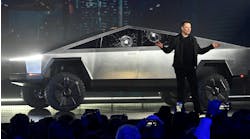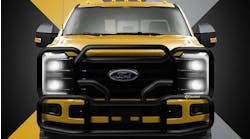With gasoline prices hitting new record highs even before the summer driving season has begun, field service businesses are ramping up the pressure on OEMs to roll out commercial hybrids.
Case in point, Verizon Communications, which is ranked America’s #1 top private fleet by FleetOwner contracted with Enova Systems to retrofit 13 GM vans with electric hybrid powertrains. These hybrids are currently operating in Washington, DC, Maryland, and Dallas.
“Long term, we’re using more hybrids in the fleet itself,” Mark Marshand, Verizon director of media relations for network & technology told FleetOwner. “We expect to see fuel savings of 50%. The body language to auto manufacturers is that ‘you might want to put these hybrids on the assembly line. If you made a hybrid van in that class in the assembly line we’d be buying them.’ [Our arrangement with Enova] is our own project because no one makes them.”
Verizon will consider retrofitting more vans if the 13 vans meet their fuel savings target, Marshand said. Additionally, the company plans to purchase 100 hybrid passenger cars this year. Verizon operates a total of 53,317 power units. The bulk of the Verizon fleet is comprised of vans, Marshand said.
Robert Minton, spokesman for GM Fleet and Commercial Operations, told FleetOwner that the price premium for rolling out commercial vans would typically not be justified by fuel savings.
“In talking with our customers, that’s not a product they’re clamoring for,” Minton said. “At this point there are no plans to release hybrid vans. We already offer diesel engines in the vans and we offer a V6 option for our customers looking to improve fuel economy.” Minton added that smaller vans could also be a viable option for service fleets, depending on the application.
“The additional expense of a hybrid powertrain in a cargo van for commercial use won’t pencil out in most cases, depending on the lifecycle of the vehicle,” Minton said.
As for third-party hybrid retrofitters, Minton said it could well be a money-losing option. “We’re aware of those companies offering hybrid conversions,” Minton said. “We certainly don’t recommend that because depending on what they do, they could make the vehicle warranty null and void.”
The National Truck Equipment Assn. (NTEA), a trade organization representing companies that provide truck equipment, said the recent record high gasoline prices will put more pressure on OEMs to make hybrids commercially available.
“The long-run impact on the industry is being noticed in terms of the amount of attention being paid to hybrids,” Stephen Latin-Kasper, NTEA market data & research director told FleetOwner. “Before fuel prices were hitting record highs, truck people simply didn’t care about hybrids. In the last couple of years it has been a hot button. Rising fuel prices are causing [the industry] to invest serious thought and dollars in terms of research efforts into hybrid technology.”
To comment on this article, write to Terrence Nguyen at [email protected]


